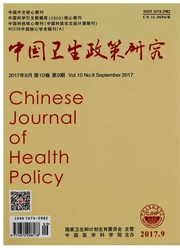

 中文摘要:
中文摘要:
基于公私伙伴关系(PPP)的相关理论与概念,本文从管理理念的变革,财政预算的压力,技术创新与服务模式的转变及健康服务业的发展等方面系统阐述了PPP模式在医疗服务领域的发展动力,并结合国际社会在医疗服务领域引入PPP模式的实践,总结了部分国家在改革实践中所取得的效果与存在的风险;研究发现,在医疗服务领域引入PPP模式对促进政府职能转变,缓解政府的筹资压力,特别是推进医疗服务供给侧的结构性改革,提升医疗服务系统对消费者需求的反应性,实现其“物有所值”的最大化等具有一定的促进作用与现实意义;但是,在实践中要处理好政府角色的定位,趋利行为与公益性,垄断与监管等方面的关系。相关的启示是,在深化医改的实践中要树立开放、包容、共享的创新发展理念,并进一步完善相关的政策法规,提升监督管理能力。
 英文摘要:
英文摘要:
Based on the concept and related theory of public-private partnership (PPP model), this paper reviewed systematically the development motivation of PPP model in the field of the medical care systems reform practice, such as the transformation of public administration idea, budget pressure of the government, technological innovation and transformation of medical care service mode, and the development of health care industry. Combined with the prac- tice of the international community to introduce PPP model, summarized systematically the major effect and existing risk in some countries have made in the practice of the reform. The study found that introducing the PPP model in the field of medical service to promote the transformation of government functions, alleviates the financing pressure of the govemment, especially to promote the medical service supply side structural reform, improve the medical service system in response to consumer demand, to achieve its maximum "value for money" has the explicit role and practical significance. However, to deal with the role of government positioning, profit behavior and public welfare, and monopoly supervision and other aspects of the relationship in the medical care systems reform practice. The suggestion inferred from the findings of this study is to establish an open, inclusive, innovative development ideas, and further, improve the relevant policies and regulations, and enhance the ability to supervise and manage in the medical systems reform.
 同期刊论文项目
同期刊论文项目
 同项目期刊论文
同项目期刊论文
 期刊信息
期刊信息
